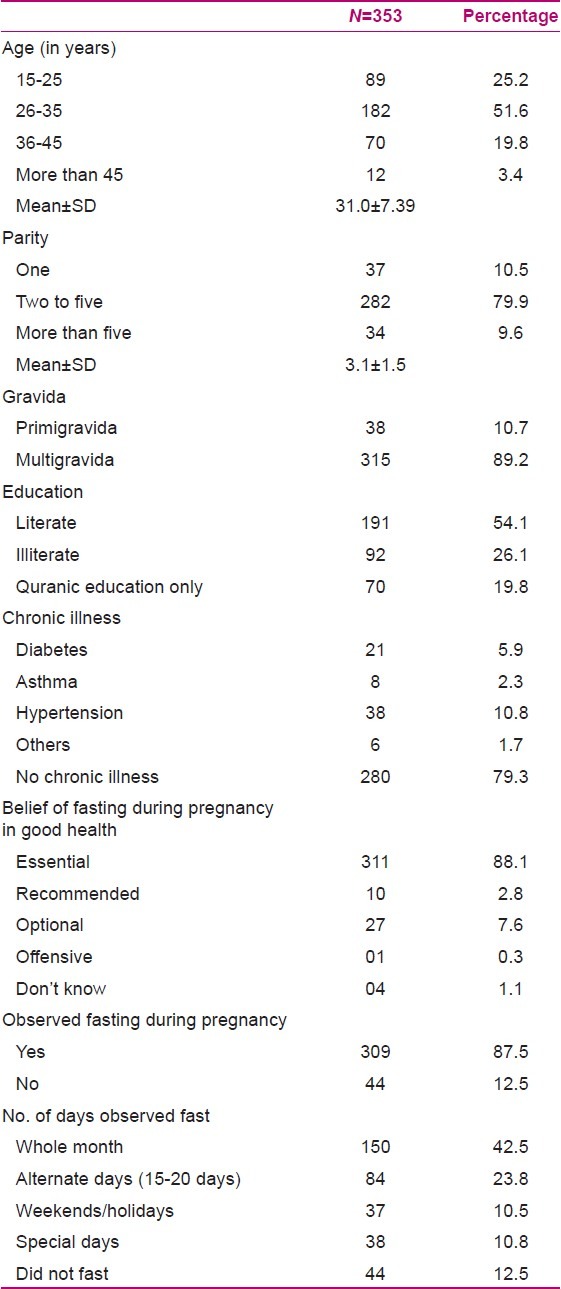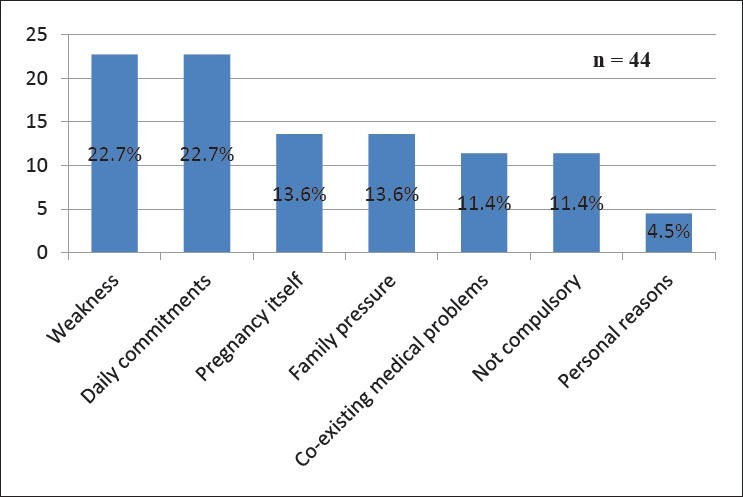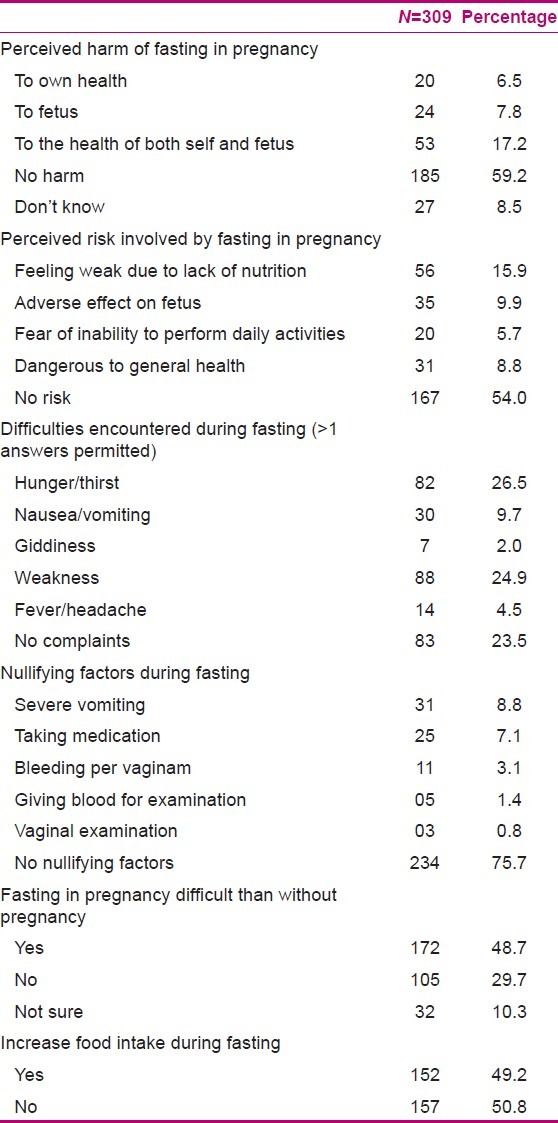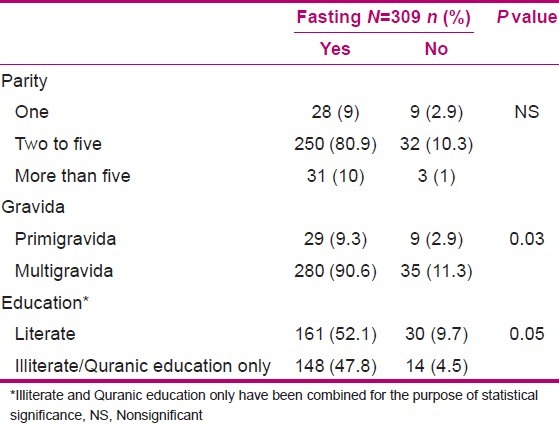Abstract
Background:
Islam clearly exempts fasting in Ramadan during sickness, pregnancy, and breastfeeding. Yet, some women prefer to fast despite realizing their increase in nutritional demand during pregnancy. Nurses and other healthcare providers face a difficult task of providing appropriate medical advice to Muslim women regarding the safety and impact of their fasting. The present study was conducted to examine the concepts and practices of maternal fasting during pregnancy in Pakistani Muslim women.
Materials and Methods:
A cross-sectional study was done in 2008 on 353 females from gynecology departments of hospitals in major cities of two provinces of Pakistan. Non-probability convenient sampling technique was used and a questionnaire was used to collect data from females who had experienced pregnancy during Ramadan at least once in life. Questions related to perceptions and practices of fasting in pregnancy along with demographic data were asked. Analysis was done on SPSS version 16. Chi-square test was used to assess associations and P < 0.05 was considered statistically significant. All ethical considerations were taken into account for the respondents.
Results:
Out of the total, 309 (87.5%) fasted during their pregnancies while 43 (12.5%) did not fast at all. Among those who fasted, 42.5% (n = 150) fasted for the whole month, 23.8% (n = 84) fasted on alternate days, 10.5% (n = 37) fasted only on weekends/holidays, and 10.8% (n = 38) fasted on particular special days. The majority perceived no harm and risk caused by fasting to them or to fetus during pregnancy. Although adverse effects during fasting were frequently reported, only 24% break their fast. A significant association was found between gravida and education with fasting (P w< 0.05). A total of 88% of women believed that fasting during pregnancy (in good health) is “obligatory” while 12% thought otherwise.
Conclusion:
Pakistani Muslim women showed a strong compassion for fasting in pregnancy despite overall decrease in maternal health indicators. There is a need for nurses and other healthcare providers in all Muslim countries and especially in non-Muslim countries with cultural diversity to be fully aware of the effects of fasting in pregnancy so that they can act promptly ensuring safe and healthy delivery.
Keywords: Fasting, Islam, Pakistan, pregnancy, women
INTRODUCTION
In Islam, fasting in the month of Ramadan is an obligatory and essential practice carried out by Muslims all over the world.[1 The routine of Ramadan fasting obligates abstinence from all food and liquid items from the crack of dawn until sunset, spread over a period of 1 month. As the Islamic calendar is shorter than the solar calendar, Ramadan slowly rotates through the seasons, and therefore the length of each fast can stretch from less than 12 h to as much as 19 h per day. Although fasting is obligatory for every adult Muslim man and women, expecting women can facilitate themselves by delaying their fast if they fear of their health or that of their baby.[2] According to a Hadith, “Allah has relieved the traveler of obligation of fasting and half of prayers and he has relieved the pregnant and nursing women of obligation of fasting”.[3] Anecdotal evidence suggests that this requirement prevents many pregnant women for opting not to fast. However, many women still opt for fasting while others remain more cautious about this practice,[4–6] and many studies have reported the metabolic effects of maternal fasting in pregnancy and its effects on the neonatal health.[7–12]
Pakistan is the second largest Muslim nation in the world having approximately 97% Muslims with 1.06 male (s)/female ratio.[13] Women of Pakistan live in a predominantly patriarchal society where male domination has become culturally sanctioned and gender-based subordination has become ingrained in the consciousness of both men and women in Pakistan.[14] There are strong gender disparities in educational attainment and uneven socioeconomic development in women’s lives. The health indicator of women in Pakistan is among the worst in the world, and it is among the few countries where women’s life expectancy is lower than that of men.[15] Furthermore, pregnancy and its associated decisions were shown to be normatively the older women’s domain, with pregnant women along with husbands being distanced for the decision-making process.[16] This cumulative effect has resulted in a low health status that leads to malnutrition among pregnant and lactating mothers and a higher child mortality rate for girls than for boys.[17,18]
Keeping in view of the Pakistani women health status and the holy month of Ramadan, nurses and other healthcare providers face a difficult task of advising them about the safety of fasting during pregnancy. Providing this advice and counsel requires that they themselves understand the beliefs and practices of fasting during pregnancy to take appropriate measure according to the health of an individual. The following study aims to examine the concepts and practices of Ramadan fasting among pregnant Muslim women in Pakistan.
MATERIALS AND METHODS
This cross-sectional study was conducted on 353 female subjects using non-probability convenient sampling technique. The data was collected during 2008 from gynecology departments of hospitals located in different cities of Sindh and Punjab. The cities covered in this multi-center study were Faisalabad, Lahore, and Rahimyar Khan from Punjab, while Karachi was the only city from Sindh. A questionnaire was designed based on similar studies already conducted on the same subject.[4,19] The questionnaire was translated by an linguistic expert in Urdu language for ease of understanding and administration to the study population. The questions were back-translated to check the validity and reliability of the main questionnaire. It consisted of demographic data that included maternal age, weight and height of the respondents, parity status, gravida, education, occupation, and presence or absence of any chronic illness. Weight and height of the participants were recorded with the help of weighing scale and measuring tape, respectively.
A Plain Language Statement (PLS) informed all respondents the purpose of the study and the utilization of information they had provided to the researcher. An informal (verbal) consent was taken from each participant before filling the questionnaire form. The researcher(s) read out the questions for the respondents and subsequently recorded their responses. Those unwilling to participate or did not properly understand the objectives or the outcomes of the study were not interviewed. Anonymity and confidentiality of their information was assured and the right to withdraw upheld. The Research Committee of Hamdard College of Medicine and Dentistry at Hamdard University approved the research.
The inclusion criteria required that the subject should be a Muslim and should have previously undergone pregnancy at least once during the month of Ramadan. Collected data was entered into a statistical software SPSS (version 16.0). Frequencies were tabulated for the demographic variables along with variables related to perceptions and practice of fasting. Cross-tabulation was used to analyze the associations between different variables related to fasting during pregnancy. Associations were assessed using Chi-square test and P value less than 0.05 was considered statistically significant.
RESULTS
A total of 353 Muslim women were enrolled in this study. Table 1 shows the demographic characteristics of the participants, their concepts and practice of fasting. With a mean age of 31 ± 7.39 years, slightly more than half of the participants fall between 26 and 35 years and were literate. Only 11% were primigravida, while 80% of the participants had two to five children. An overwhelming majority (88%) believed that fasting is “essential” during pregnancy in good health. Almost the same number (87.5%) reported to fast during their pregnancy - 150 (42.5%) fast for the whole month and 84 (23.8%) fast on alternate days. Only 44 (12.5%) women reported to exempt themselves from fasting. Weakness during pregnancy and daily commitments were the most frequent reasons for not fasting [Figure 1]. Moreover, it was observed that among those who did not fast, 36 (81.8%) thought about repaying fast after pregnancy was over while 8 (18%) respondents did not.
Table 1.
Demographic profile of the participants, belief, and practice of fasting during pregnancy

Figure 1.

Reasons for not fasting during pregnancy by respondents
The majority of respondents (59%) perceived no harm to the health of fetus and themselves due to fasting during pregnancy. Among those who perceived to have a risk by fasting in pregnancy, only 56 (16%) of the respondents thought weakness is caused by lack of nutrition. Hunger/thirst (26.5%) and weakness (25%) were the most frequent side effects that were reported during fasting, while severe vomiting and taking medication were the reasons that nullify the fast by 31 (8.8%) and 25 (7%) of the respondents, respectively. Slightly less than half of the respondents (48.7%) admitted that fasting in pregnancy is difficult to observe than without it, while the same percentage agreed to have increased food intake during fasting [Table 2].
Table 2.
Perceptions of respondents who observed fasting during pregnancy

The results were found to be statistically significant when fasting was cross-tabulated with gravida and educational status (P = 0.05). However, it was not found to be significant by parity [Table 3].
Table 3.
Cross-tabulation of parity, gravida, and education with fasting in pregnancy

DISCUSSION
The present study gives a clear insight of the perceptions and practices of fasting among Pakistani women during pregnancy. This study reflects perceptions and practices of Muslim women in the context of an officially designated Islamic country, whereas studies done on this subject were carried out in non-Muslim countries like USA,[19] Canada,[20] and Singapore.[4]
Despite the fact that only 54% females were literate, an overwhelming majority (88%) not only had a strong belief that fasting in good health is an essential obligation in Islam, but also they had observed fasting during pregnancy. Contrary to this, only 67% had correct perceptions of the rule for fasting in pregnancy among Muslim women living in Singapore.[4] Furthermore, in that study, a large majority (87%) fasted only at least for a day, whereas in the present study nearly, half of the respondents (43%) observed fasting for the whole month. Similarly high rates of practices for observing fast among Muslims during pregnancy were also reported in other studies.[5,21,22] A study done in the USA that reported more immigrant women fasted during pregnancy than those who were born in the USA verified the influence of strong religious beliefs of a Muslim country.[19]
As many Muslim pregnant women intend to observe fasting, still many remained worried about risking the health of their fetus.[8,23] In the present study, only 7.8% of women thought that fasting during pregnancy might harm their fetus. A recent qualitative study on Somalian and Bangladeshi females based on participants’ view and perception reported that positive health effects of fasting outweighed any negative effects or concerns about health. The study also highlighted a strong spiritual affirmation for fasting during Ramadan.[22] Similarly, quantitative studies have also concluded that fasting has no inappropriate effect on intrauterine growth and both time indices.[5,11,12,23] Although adult female literacy stands only 45%,[24] a strong inclination toward religion among Pakistani women might be one of the reasons for the low attitude of risk for their fetus. However, contrary to this, nearly half (49%) of the respondents reported that observing fast during pregnancy is difficult than without it. This indicates that either they are unaware of the permissibility and exemption of fasting in Islam during that period or there is lack of communication by nurses and other healthcare staff to provide such relevant information to pregnant women. A recent study supports this claim that reported the inability to identify Muslim obligations and practices during treatment interventions by non-Muslim physicians.[22]
As nurses and healthcare staff members are usually the first contact persons for pregnant women, they can play a greater role in addressing in detail the risks and benefits associated with fasting in pregnancy. It becomes more relevant in countries like Pakistan and Iran with a Muslim majority. This can only be practiced if correct and up-to-date knowledge regarding all religious aspects and physical implications is provided to fasting pregnant women.[25] Furthermore, nurses and other healthcare providers can take the advantage of specific guidelines developed by Robinson and Raisler (2005) that aimed for improving the quality of care of women who observe fasting during pregnancy.[19] Also, keeping in mind the reported medical conditions such as high prevalence of anemia in pregnancy among Pakistanis,[26–29] this study necessitates that women should be aware of the risks they impose on themselves and on their fetus if they are in poor health.
As the ethnic background and family system of the respondents were not identified, perceptions of fasting within these groups cannot be ascertained and remain as one of the study limitations. In addition, although questionnaire was developed keeping in view the already published studies, the validity of the questionnaire within the local setting was not done. In order to identify issues within the local cultural and ethnic settings, studies need to be done in other Muslim countries. Longitudinal studies that focus on maternal fasting and long-term impacts on the child should be explored.
CONCLUSION
The results in the present study evidently support the fact that a larger population of Pakistani Muslim women fast during their pregnancies and they have appropriate knowledge of Islamic rules regarding fasting. Furthermore, those women who do not observe fasting during pregnancy due to some reasons also had a clear concept about repaying it later. Keeping in mind the spirit of fasting among these women, it is suggested that nurses, general physicians, health professionals, and prenatal care providers in all Muslim countries, while addressing pregnant Muslim women, should respect their desire to fast. This can also be pertinent to those healthcare workers in countries with Muslim minorities, but having significant cultural diversity. In circumstances when fasting poses a risk to their health, they should be fully aware of the physical alterations occurring during Ramadan and the effect of Islamic fasting on various diseases to provide ample evidence to support their disagreement to fast by pregnant women.
Footnotes
Source of Support: None
Conflict of Interest: None.
REFERENCES
- 1.Surah Al-Baqara (The Cow). Chapter 2: Verse. The Holy Quran; pp. 183–14. [Google Scholar]
- 2.Azizi F. Research in Islamic fasting and health. Ann Saudi Med. 2002;22:186–91. doi: 10.5144/0256-4947.2002.186. [DOI] [PubMed] [Google Scholar]
- 3.Nasai A, Nasai Sunan. Book of Fasting. Vol-2. Karachi: Darul Ishaat Publishers; Hadith No.2274. [Google Scholar]
- 4.Joosoph J, Abu J, Yu SL. A survey of fasting during pregnancy. Singapore Med J. 2004;45:583–6. [PubMed] [Google Scholar]
- 5.Kavehmanesh Z, Abolghasemi H. Maternal Ramadan fasting and neonatal health. J Perinatol. 2004;24:748–50. doi: 10.1038/sj.jp.7211189. [DOI] [PubMed] [Google Scholar]
- 6.Kridli SA. Health beliefs and practices of Muslim women during Ramadan. MCN Am J Matern Child Nurs. 2011;36:216–21. doi: 10.1097/NMC.0b013e3182177177. [DOI] [PubMed] [Google Scholar]; Kridli SA. Health beliefs and practices of Muslim women during Ramadan. :22–3. doi: 10.1097/NMC.0b013e3182177177. [DOI] [PubMed] [Google Scholar]
- 7.Shahgheibi S, Ghadery E, Pauladi A, Hasani S, Shahsawari S. Effects of fasting during the third trimester of pregnancy on neonatal growth indices. Annals of Alquds Medicine. 2005;2:58–62. [Google Scholar]
- 8.Arab M. Ketonuria and serum gulcose of fasting pregnant women at the end of a day in Ramadan. Acta Med Iran. 2004;42:209–12. [Google Scholar]
- 9.Bandyopadhyay S, Thakur JS, Ray P, Kumar R. High prevalence of bacteriuria in pregnancy and its screening methods in north India. J Indian Med Assoc. 2005;103:259–62. 66. [PubMed] [Google Scholar]
- 10.Dikensoy E, Balat O, Cebesoy B, Ozkur A, Cicek H, Can G. Effect of fasting during Ramadan on fetal development and maternal health. J Obstet Gynaecol Res. 2008;34:494–8. doi: 10.1111/j.1447-0756.2008.00814.x. [DOI] [PubMed] [Google Scholar]
- 11.Dikensoy E, Balat O, Cebesoy B, Ozkur A, Cicek H, Can G. The effect of Ramadan fasting on maternal serum lipids, cortisol levels and fetal development. Arch Gynecol Obstet. 2009;279:119–23. doi: 10.1007/s00404-008-0680-x. [DOI] [PubMed] [Google Scholar]
- 12.Ziaee V, Kihanidoost Z, Younesian M, Bagher M, Akhavirad, Bateni F, et al. The Effect of Ramadan Fasting on Outcome of Pregnancy. Iran J Pediatr. 2010;20:181–6. [PMC free article] [PubMed] [Google Scholar]
- 13.Pakistan, Islam In: The Oxford Dictionary of Islam. 2003. [Last accessed on 2010 Jul 6]. Available from: http://www.oxfordislamicstudies.com/article/opr/t125/e1809?_hi=1 and _pos=1 .
- 14.Khan MM. Health Policy Analysis: The Case of Pakistan. Netherland: University of Groningen; 2006. [Google Scholar]
- 15.Asian Development Bank. Country Briefing Paper: Women in Pakistan: Asian Development Bank, Programs Department and Office of Environment and Social Development. 2000. [Last accessed on 2010 Jul 6]. Available from: http://wwwadborg/sites/default/files/pub/2000/women_pakistanpdf .
- 16.Mumtaz Z, Salway SM. Gender, pregnancy and the uptake of antenatal care services in Pakistan. Sociol Health Illn. 2007;29:1–26. doi: 10.1111/j.1467-9566.2007.00519.x. [DOI] [PubMed] [Google Scholar]
- 17.Rehman S, Obaid-ur-Rehman M, Ahmed T. Diseases causing biochemical changes during pregnancy in the population of Karachi. Pak J Pharm Sci. 2004;17:125–7. [PubMed] [Google Scholar]
- 18.Khan A, Bhutta ZA. Maternal Health and Malnutrition in Pakistan: A Situtional Analysis. Karachi: Agha Khan University and UNICEF; 2001. [Google Scholar]
- 19.Robinson T, Raisler J. “Each one is a doctor for herself”: Ramadan fasting among pregnant Muslim women in the United States. Ethn Dis. 2005;15:S1–99. 103. [PubMed] [Google Scholar]
- 20.Hoskins A. Pregnancy and fasting during Ramadan. BMJ. 1992;304:1247. doi: 10.1136/bmj.304.6836.1247. [DOI] [PMC free article] [PubMed] [Google Scholar]
- 21.Pearce A, Mayho P. Provision of antenatal care during Ramadan. Br J Midwifery. 2004;12:750–2. [Google Scholar]
- 22.Pathy R, Mills KE, Gazeley S, Ridgley A, Kiran T. Health is a spiritual thing: Perspectives of health care professionals and female Somali and Bangladeshi women on the health impacts of fasting during Ramadan. Ethn Health. 2011;16:43–56. doi: 10.1080/13557858.2010.523780. [DOI] [PubMed] [Google Scholar]
- 23.Arab M. Interrelation of Ramadan fasting and birth weight. Med J Islam Acad Sci. 2001;14:91–5. [Google Scholar]
- 24.Pakistan Bureau of Statistics. Pakistan Social and Living Standards Measurement Survey. Islamabad: Pakistan Bureau of Statistics; 2010. [Google Scholar]
- 25.Bertakis KD, Azari R, Helms LJ, Callahan EJ, Robbins JA. Gender differences in the utilization of health care services. J Fam Pract. 2000;49:147–52. [PubMed] [Google Scholar]
- 26.Rizwan F, Qamarunisa, Habibullah, Memon A. Prevalence of anemia in pregnant women and its effects on maternal and fetal morbidity and mortality. Pak J Med Sci. 2010;26:92–5. [Google Scholar]
- 27.Lone FW, Qureshi RN, Emmanuel F. Maternal anemia and its impact on perinatal outcome in a tertiary care hospital in Pakistan. East Mediterr Health J. 2004;10:801–07. [PubMed] [Google Scholar]
- 28.Sohail R, Zainab S, Zaman F. Prevalence of anemia in Obstetrical population. Ann King Edward Med Coll. 2004;10:146–8. [Google Scholar]
- 29.Taseer IH, Mirbahar A, Safdar S, Awan Z. Anemia in pregnancy: Related risk factors in under developed area. Professional Med J. 2011;18:1–4. [Google Scholar]


